Law of International Trade: Sales Contracts Report
VerifiedAdded on 2020/10/22
|10
|3283
|401
Report
AI Summary
This report provides a comprehensive analysis of the law of international trade, focusing on international sales contracts. It begins by defining different types of international sales contracts, such as Free on Board (FOB) and Cost, Insurance, and Freight (CIF) contracts, and differentiating between them. The report then delves into the rights and obligations of parties involved in these contracts, including the buyer's right to timely delivery and the seller's right to payment. It examines the reasons behind these rights and obligations, emphasizing their role in protecting interests, ensuring contract performance, and promoting international business. The report also explores the Vienna Convention's role in imposing rights and liabilities on buyers and sellers, highlighting the differences in their rights and obligations. It discusses the rationales behind these rights and liabilities, such as maintaining uniformity and promoting fair practices. Finally, the report covers the interplay of trade finance and regulatory issues, including dispute resolution, providing a complete overview of key aspects in international trade law.
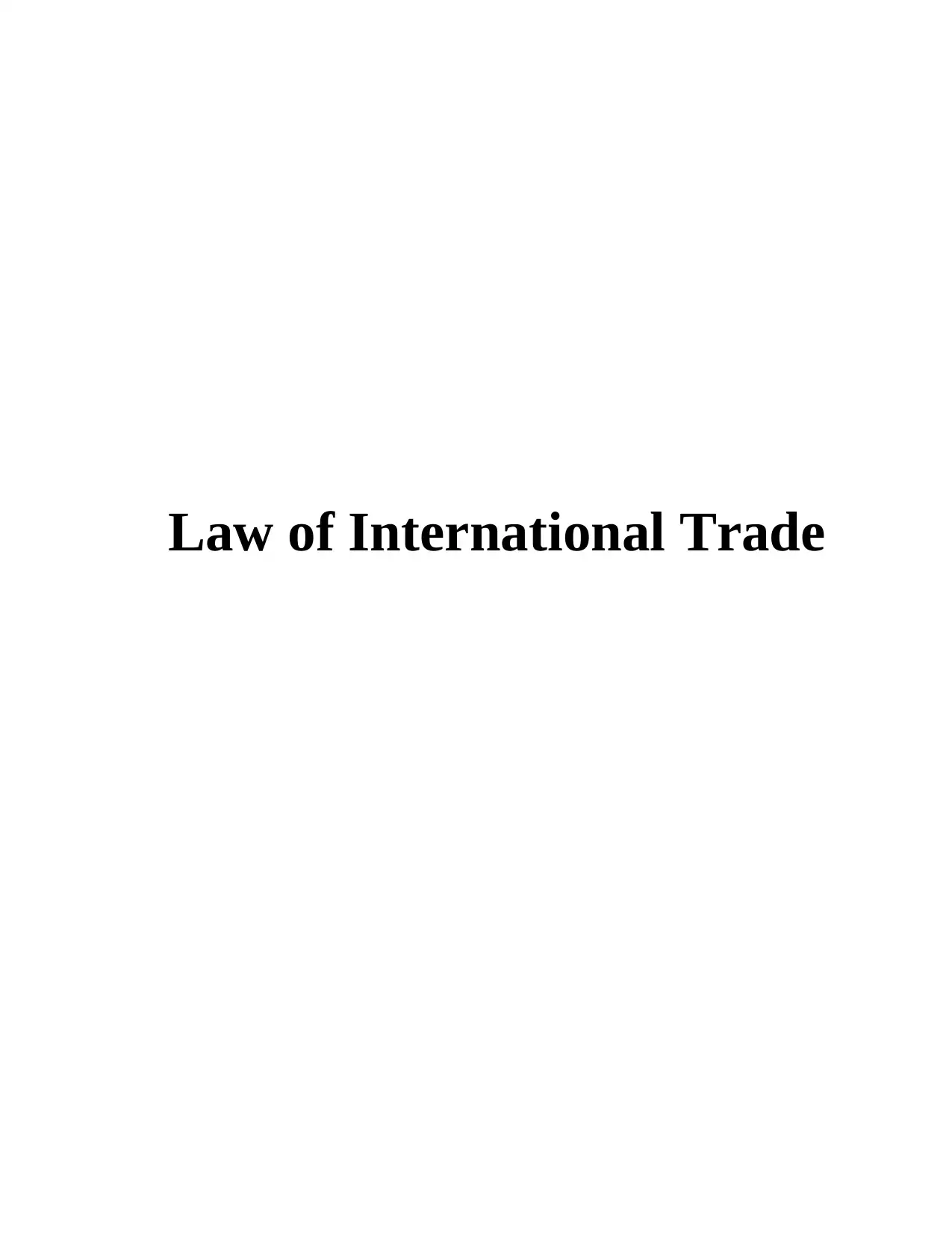
Law of International Trade
Paraphrase This Document
Need a fresh take? Get an instant paraphrase of this document with our AI Paraphraser
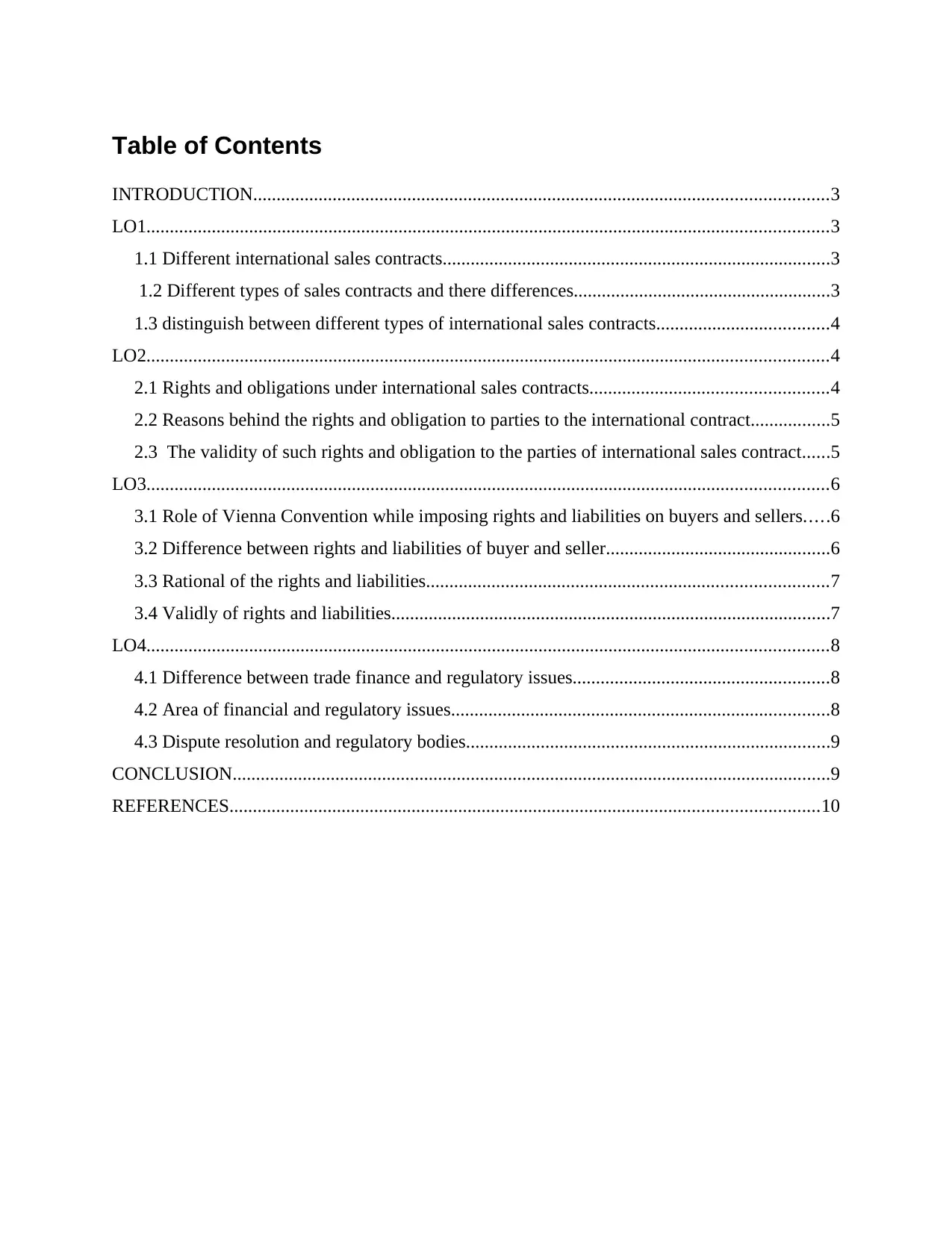
Table of Contents
INTRODUCTION...........................................................................................................................3
LO1..................................................................................................................................................3
1.1 Different international sales contracts...................................................................................3
1.2 Different types of sales contracts and there differences.......................................................3
1.3 distinguish between different types of international sales contracts.....................................4
LO2..................................................................................................................................................4
2.1 Rights and obligations under international sales contracts...................................................4
2.2 Reasons behind the rights and obligation to parties to the international contract.................5
2.3 The validity of such rights and obligation to the parties of international sales contract......5
LO3..................................................................................................................................................6
3.1 Role of Vienna Convention while imposing rights and liabilities on buyers and sellers.....6
3.2 Difference between rights and liabilities of buyer and seller................................................6
3.3 Rational of the rights and liabilities......................................................................................7
3.4 Validly of rights and liabilities..............................................................................................7
LO4..................................................................................................................................................8
4.1 Difference between trade finance and regulatory issues.......................................................8
4.2 Area of financial and regulatory issues.................................................................................8
4.3 Dispute resolution and regulatory bodies..............................................................................9
CONCLUSION................................................................................................................................9
REFERENCES..............................................................................................................................10
INTRODUCTION...........................................................................................................................3
LO1..................................................................................................................................................3
1.1 Different international sales contracts...................................................................................3
1.2 Different types of sales contracts and there differences.......................................................3
1.3 distinguish between different types of international sales contracts.....................................4
LO2..................................................................................................................................................4
2.1 Rights and obligations under international sales contracts...................................................4
2.2 Reasons behind the rights and obligation to parties to the international contract.................5
2.3 The validity of such rights and obligation to the parties of international sales contract......5
LO3..................................................................................................................................................6
3.1 Role of Vienna Convention while imposing rights and liabilities on buyers and sellers.....6
3.2 Difference between rights and liabilities of buyer and seller................................................6
3.3 Rational of the rights and liabilities......................................................................................7
3.4 Validly of rights and liabilities..............................................................................................7
LO4..................................................................................................................................................8
4.1 Difference between trade finance and regulatory issues.......................................................8
4.2 Area of financial and regulatory issues.................................................................................8
4.3 Dispute resolution and regulatory bodies..............................................................................9
CONCLUSION................................................................................................................................9
REFERENCES..............................................................................................................................10
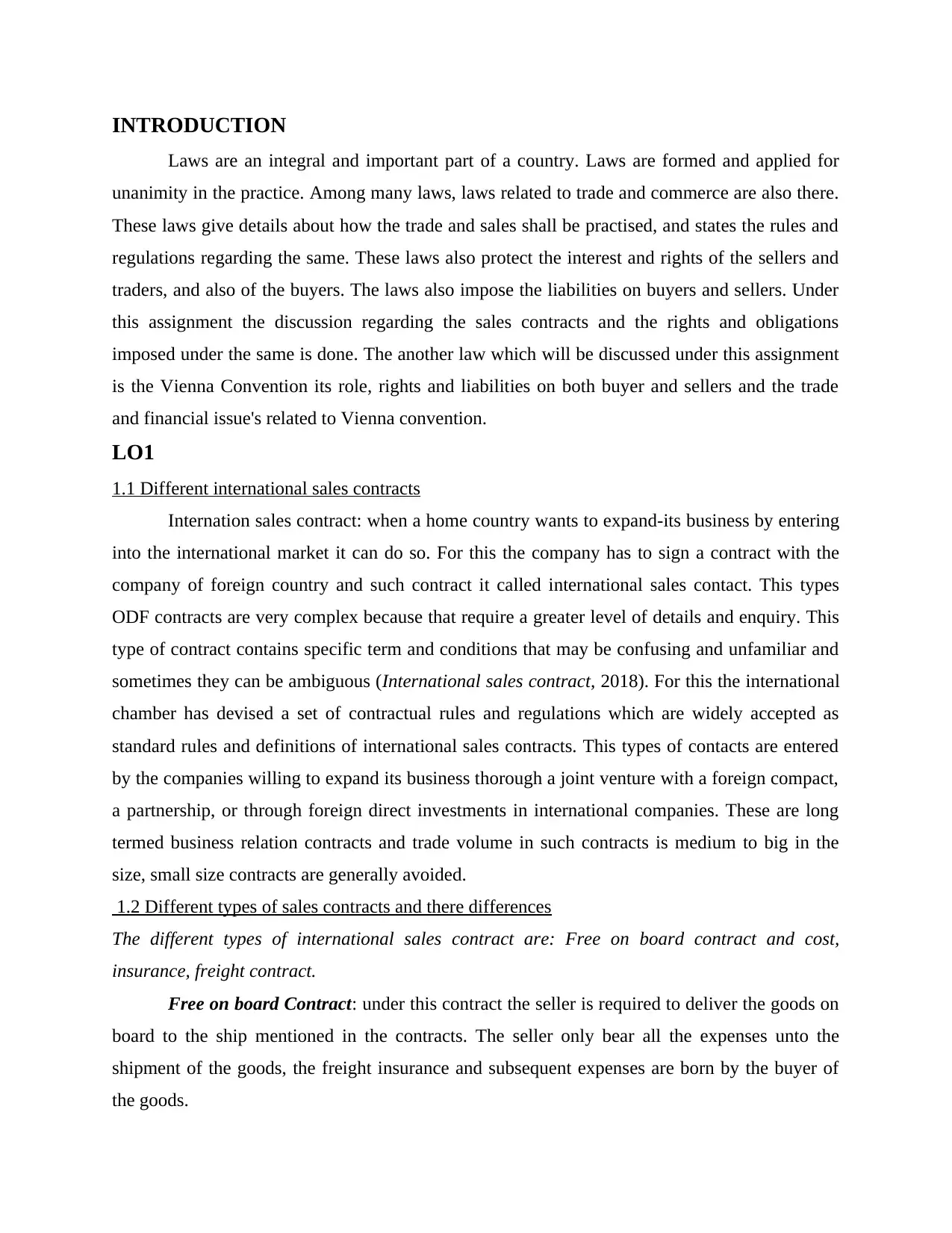
INTRODUCTION
Laws are an integral and important part of a country. Laws are formed and applied for
unanimity in the practice. Among many laws, laws related to trade and commerce are also there.
These laws give details about how the trade and sales shall be practised, and states the rules and
regulations regarding the same. These laws also protect the interest and rights of the sellers and
traders, and also of the buyers. The laws also impose the liabilities on buyers and sellers. Under
this assignment the discussion regarding the sales contracts and the rights and obligations
imposed under the same is done. The another law which will be discussed under this assignment
is the Vienna Convention its role, rights and liabilities on both buyer and sellers and the trade
and financial issue's related to Vienna convention.
LO1
1.1 Different international sales contracts
Internation sales contract: when a home country wants to expand-its business by entering
into the international market it can do so. For this the company has to sign a contract with the
company of foreign country and such contract it called international sales contact. This types
ODF contracts are very complex because that require a greater level of details and enquiry. This
type of contract contains specific term and conditions that may be confusing and unfamiliar and
sometimes they can be ambiguous (International sales contract, 2018). For this the international
chamber has devised a set of contractual rules and regulations which are widely accepted as
standard rules and definitions of international sales contracts. This types of contacts are entered
by the companies willing to expand its business thorough a joint venture with a foreign compact,
a partnership, or through foreign direct investments in international companies. These are long
termed business relation contracts and trade volume in such contracts is medium to big in the
size, small size contracts are generally avoided.
1.2 Different types of sales contracts and there differences
The different types of international sales contract are: Free on board contract and cost,
insurance, freight contract.
Free on board Contract: under this contract the seller is required to deliver the goods on
board to the ship mentioned in the contracts. The seller only bear all the expenses unto the
shipment of the goods, the freight insurance and subsequent expenses are born by the buyer of
the goods.
Laws are an integral and important part of a country. Laws are formed and applied for
unanimity in the practice. Among many laws, laws related to trade and commerce are also there.
These laws give details about how the trade and sales shall be practised, and states the rules and
regulations regarding the same. These laws also protect the interest and rights of the sellers and
traders, and also of the buyers. The laws also impose the liabilities on buyers and sellers. Under
this assignment the discussion regarding the sales contracts and the rights and obligations
imposed under the same is done. The another law which will be discussed under this assignment
is the Vienna Convention its role, rights and liabilities on both buyer and sellers and the trade
and financial issue's related to Vienna convention.
LO1
1.1 Different international sales contracts
Internation sales contract: when a home country wants to expand-its business by entering
into the international market it can do so. For this the company has to sign a contract with the
company of foreign country and such contract it called international sales contact. This types
ODF contracts are very complex because that require a greater level of details and enquiry. This
type of contract contains specific term and conditions that may be confusing and unfamiliar and
sometimes they can be ambiguous (International sales contract, 2018). For this the international
chamber has devised a set of contractual rules and regulations which are widely accepted as
standard rules and definitions of international sales contracts. This types of contacts are entered
by the companies willing to expand its business thorough a joint venture with a foreign compact,
a partnership, or through foreign direct investments in international companies. These are long
termed business relation contracts and trade volume in such contracts is medium to big in the
size, small size contracts are generally avoided.
1.2 Different types of sales contracts and there differences
The different types of international sales contract are: Free on board contract and cost,
insurance, freight contract.
Free on board Contract: under this contract the seller is required to deliver the goods on
board to the ship mentioned in the contracts. The seller only bear all the expenses unto the
shipment of the goods, the freight insurance and subsequent expenses are born by the buyer of
the goods.
⊘ This is a preview!⊘
Do you want full access?
Subscribe today to unlock all pages.

Trusted by 1+ million students worldwide
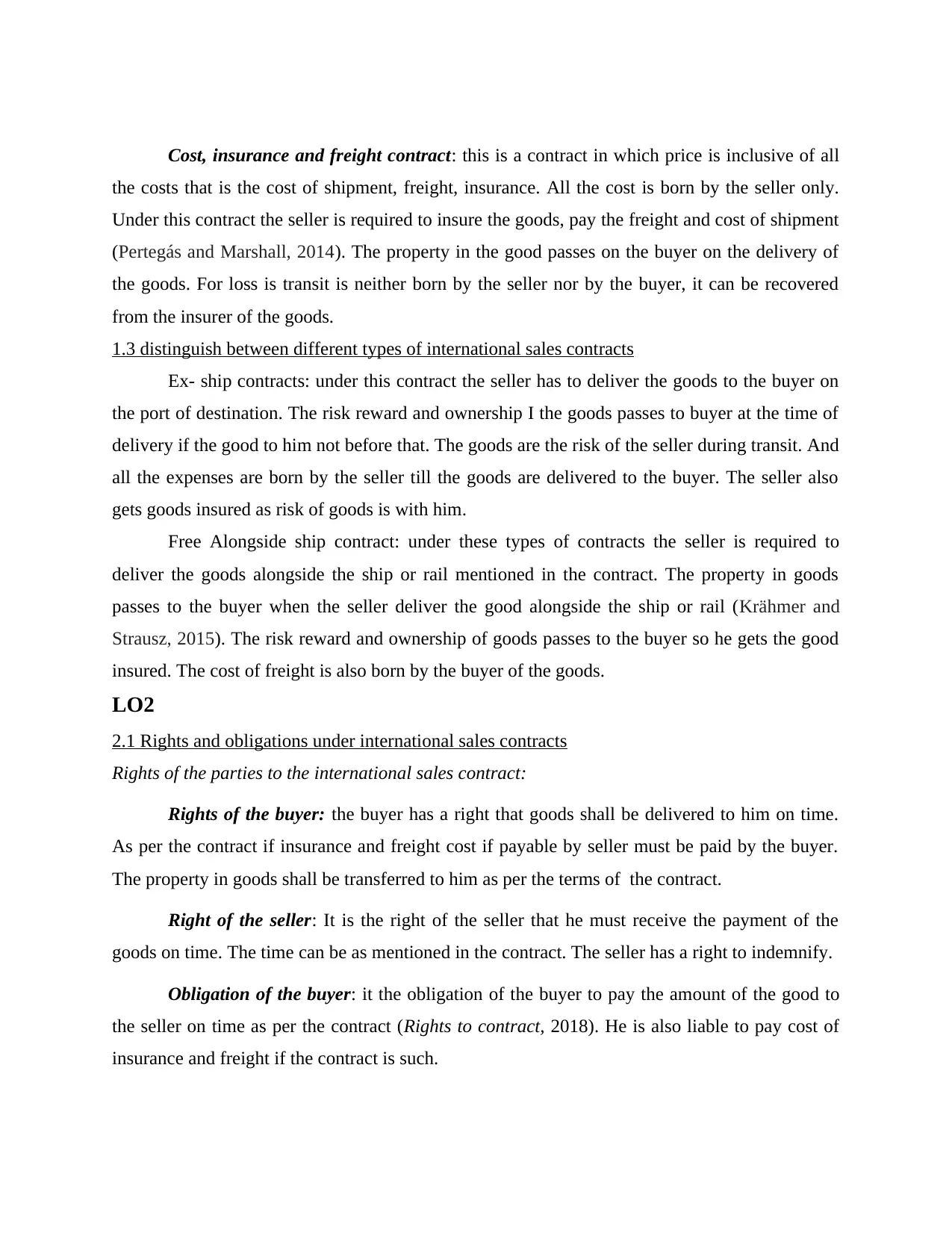
Cost, insurance and freight contract: this is a contract in which price is inclusive of all
the costs that is the cost of shipment, freight, insurance. All the cost is born by the seller only.
Under this contract the seller is required to insure the goods, pay the freight and cost of shipment
(Pertegás and Marshall, 2014). The property in the good passes on the buyer on the delivery of
the goods. For loss is transit is neither born by the seller nor by the buyer, it can be recovered
from the insurer of the goods.
1.3 distinguish between different types of international sales contracts
Ex- ship contracts: under this contract the seller has to deliver the goods to the buyer on
the port of destination. The risk reward and ownership I the goods passes to buyer at the time of
delivery if the good to him not before that. The goods are the risk of the seller during transit. And
all the expenses are born by the seller till the goods are delivered to the buyer. The seller also
gets goods insured as risk of goods is with him.
Free Alongside ship contract: under these types of contracts the seller is required to
deliver the goods alongside the ship or rail mentioned in the contract. The property in goods
passes to the buyer when the seller deliver the good alongside the ship or rail (Krähmer and
Strausz, 2015). The risk reward and ownership of goods passes to the buyer so he gets the good
insured. The cost of freight is also born by the buyer of the goods.
LO2
2.1 Rights and obligations under international sales contracts
Rights of the parties to the international sales contract:
Rights of the buyer: the buyer has a right that goods shall be delivered to him on time.
As per the contract if insurance and freight cost if payable by seller must be paid by the buyer.
The property in goods shall be transferred to him as per the terms of the contract.
Right of the seller: It is the right of the seller that he must receive the payment of the
goods on time. The time can be as mentioned in the contract. The seller has a right to indemnify.
Obligation of the buyer: it the obligation of the buyer to pay the amount of the good to
the seller on time as per the contract (Rights to contract, 2018). He is also liable to pay cost of
insurance and freight if the contract is such.
the costs that is the cost of shipment, freight, insurance. All the cost is born by the seller only.
Under this contract the seller is required to insure the goods, pay the freight and cost of shipment
(Pertegás and Marshall, 2014). The property in the good passes on the buyer on the delivery of
the goods. For loss is transit is neither born by the seller nor by the buyer, it can be recovered
from the insurer of the goods.
1.3 distinguish between different types of international sales contracts
Ex- ship contracts: under this contract the seller has to deliver the goods to the buyer on
the port of destination. The risk reward and ownership I the goods passes to buyer at the time of
delivery if the good to him not before that. The goods are the risk of the seller during transit. And
all the expenses are born by the seller till the goods are delivered to the buyer. The seller also
gets goods insured as risk of goods is with him.
Free Alongside ship contract: under these types of contracts the seller is required to
deliver the goods alongside the ship or rail mentioned in the contract. The property in goods
passes to the buyer when the seller deliver the good alongside the ship or rail (Krähmer and
Strausz, 2015). The risk reward and ownership of goods passes to the buyer so he gets the good
insured. The cost of freight is also born by the buyer of the goods.
LO2
2.1 Rights and obligations under international sales contracts
Rights of the parties to the international sales contract:
Rights of the buyer: the buyer has a right that goods shall be delivered to him on time.
As per the contract if insurance and freight cost if payable by seller must be paid by the buyer.
The property in goods shall be transferred to him as per the terms of the contract.
Right of the seller: It is the right of the seller that he must receive the payment of the
goods on time. The time can be as mentioned in the contract. The seller has a right to indemnify.
Obligation of the buyer: it the obligation of the buyer to pay the amount of the good to
the seller on time as per the contract (Rights to contract, 2018). He is also liable to pay cost of
insurance and freight if the contract is such.
Paraphrase This Document
Need a fresh take? Get an instant paraphrase of this document with our AI Paraphraser
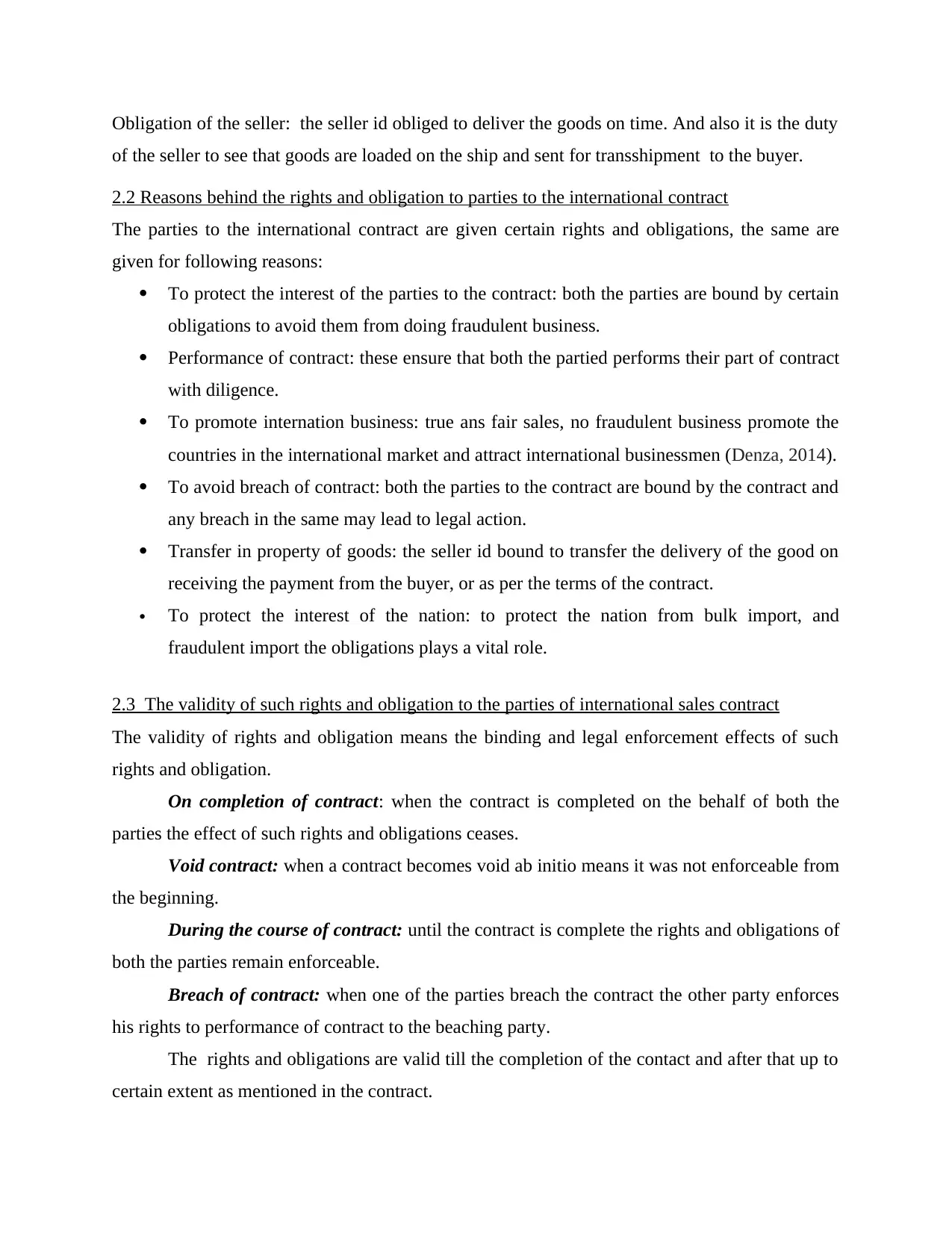
Obligation of the seller: the seller id obliged to deliver the goods on time. And also it is the duty
of the seller to see that goods are loaded on the ship and sent for transshipment to the buyer.
2.2 Reasons behind the rights and obligation to parties to the international contract
The parties to the international contract are given certain rights and obligations, the same are
given for following reasons:
To protect the interest of the parties to the contract: both the parties are bound by certain
obligations to avoid them from doing fraudulent business.
Performance of contract: these ensure that both the partied performs their part of contract
with diligence.
To promote internation business: true ans fair sales, no fraudulent business promote the
countries in the international market and attract international businessmen (Denza, 2014).
To avoid breach of contract: both the parties to the contract are bound by the contract and
any breach in the same may lead to legal action.
Transfer in property of goods: the seller id bound to transfer the delivery of the good on
receiving the payment from the buyer, or as per the terms of the contract.
To protect the interest of the nation: to protect the nation from bulk import, and
fraudulent import the obligations plays a vital role.
2.3 The validity of such rights and obligation to the parties of international sales contract
The validity of rights and obligation means the binding and legal enforcement effects of such
rights and obligation.
On completion of contract: when the contract is completed on the behalf of both the
parties the effect of such rights and obligations ceases.
Void contract: when a contract becomes void ab initio means it was not enforceable from
the beginning.
During the course of contract: until the contract is complete the rights and obligations of
both the parties remain enforceable.
Breach of contract: when one of the parties breach the contract the other party enforces
his rights to performance of contract to the beaching party.
The rights and obligations are valid till the completion of the contact and after that up to
certain extent as mentioned in the contract.
of the seller to see that goods are loaded on the ship and sent for transshipment to the buyer.
2.2 Reasons behind the rights and obligation to parties to the international contract
The parties to the international contract are given certain rights and obligations, the same are
given for following reasons:
To protect the interest of the parties to the contract: both the parties are bound by certain
obligations to avoid them from doing fraudulent business.
Performance of contract: these ensure that both the partied performs their part of contract
with diligence.
To promote internation business: true ans fair sales, no fraudulent business promote the
countries in the international market and attract international businessmen (Denza, 2014).
To avoid breach of contract: both the parties to the contract are bound by the contract and
any breach in the same may lead to legal action.
Transfer in property of goods: the seller id bound to transfer the delivery of the good on
receiving the payment from the buyer, or as per the terms of the contract.
To protect the interest of the nation: to protect the nation from bulk import, and
fraudulent import the obligations plays a vital role.
2.3 The validity of such rights and obligation to the parties of international sales contract
The validity of rights and obligation means the binding and legal enforcement effects of such
rights and obligation.
On completion of contract: when the contract is completed on the behalf of both the
parties the effect of such rights and obligations ceases.
Void contract: when a contract becomes void ab initio means it was not enforceable from
the beginning.
During the course of contract: until the contract is complete the rights and obligations of
both the parties remain enforceable.
Breach of contract: when one of the parties breach the contract the other party enforces
his rights to performance of contract to the beaching party.
The rights and obligations are valid till the completion of the contact and after that up to
certain extent as mentioned in the contract.
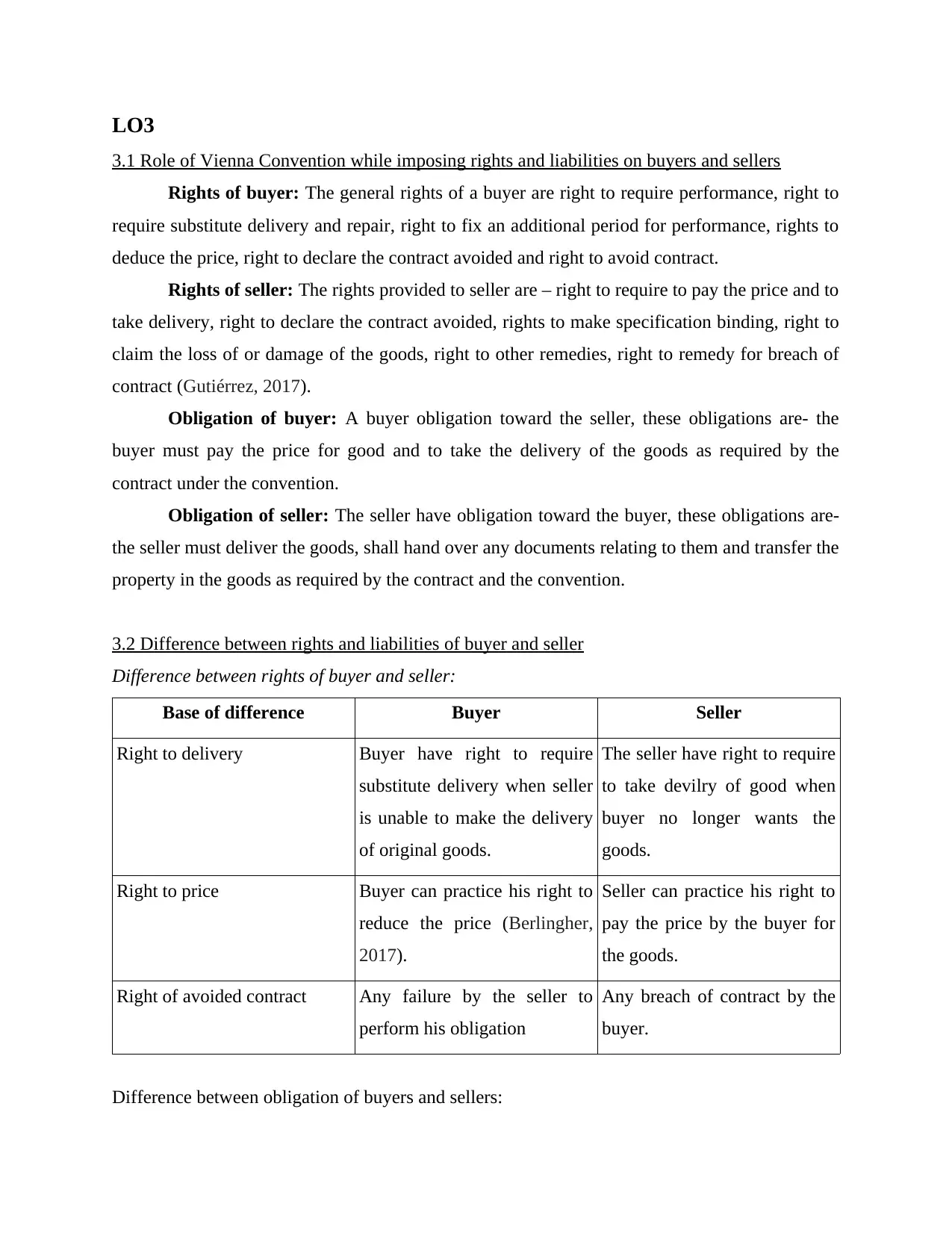
LO3
3.1 Role of Vienna Convention while imposing rights and liabilities on buyers and sellers
Rights of buyer: The general rights of a buyer are right to require performance, right to
require substitute delivery and repair, right to fix an additional period for performance, rights to
deduce the price, right to declare the contract avoided and right to avoid contract.
Rights of seller: The rights provided to seller are – right to require to pay the price and to
take delivery, right to declare the contract avoided, rights to make specification binding, right to
claim the loss of or damage of the goods, right to other remedies, right to remedy for breach of
contract (Gutiérrez, 2017).
Obligation of buyer: A buyer obligation toward the seller, these obligations are- the
buyer must pay the price for good and to take the delivery of the goods as required by the
contract under the convention.
Obligation of seller: The seller have obligation toward the buyer, these obligations are-
the seller must deliver the goods, shall hand over any documents relating to them and transfer the
property in the goods as required by the contract and the convention.
3.2 Difference between rights and liabilities of buyer and seller
Difference between rights of buyer and seller:
Base of difference Buyer Seller
Right to delivery Buyer have right to require
substitute delivery when seller
is unable to make the delivery
of original goods.
The seller have right to require
to take devilry of good when
buyer no longer wants the
goods.
Right to price Buyer can practice his right to
reduce the price (Berlingher,
2017).
Seller can practice his right to
pay the price by the buyer for
the goods.
Right of avoided contract Any failure by the seller to
perform his obligation
Any breach of contract by the
buyer.
Difference between obligation of buyers and sellers:
3.1 Role of Vienna Convention while imposing rights and liabilities on buyers and sellers
Rights of buyer: The general rights of a buyer are right to require performance, right to
require substitute delivery and repair, right to fix an additional period for performance, rights to
deduce the price, right to declare the contract avoided and right to avoid contract.
Rights of seller: The rights provided to seller are – right to require to pay the price and to
take delivery, right to declare the contract avoided, rights to make specification binding, right to
claim the loss of or damage of the goods, right to other remedies, right to remedy for breach of
contract (Gutiérrez, 2017).
Obligation of buyer: A buyer obligation toward the seller, these obligations are- the
buyer must pay the price for good and to take the delivery of the goods as required by the
contract under the convention.
Obligation of seller: The seller have obligation toward the buyer, these obligations are-
the seller must deliver the goods, shall hand over any documents relating to them and transfer the
property in the goods as required by the contract and the convention.
3.2 Difference between rights and liabilities of buyer and seller
Difference between rights of buyer and seller:
Base of difference Buyer Seller
Right to delivery Buyer have right to require
substitute delivery when seller
is unable to make the delivery
of original goods.
The seller have right to require
to take devilry of good when
buyer no longer wants the
goods.
Right to price Buyer can practice his right to
reduce the price (Berlingher,
2017).
Seller can practice his right to
pay the price by the buyer for
the goods.
Right of avoided contract Any failure by the seller to
perform his obligation
Any breach of contract by the
buyer.
Difference between obligation of buyers and sellers:
⊘ This is a preview!⊘
Do you want full access?
Subscribe today to unlock all pages.

Trusted by 1+ million students worldwide
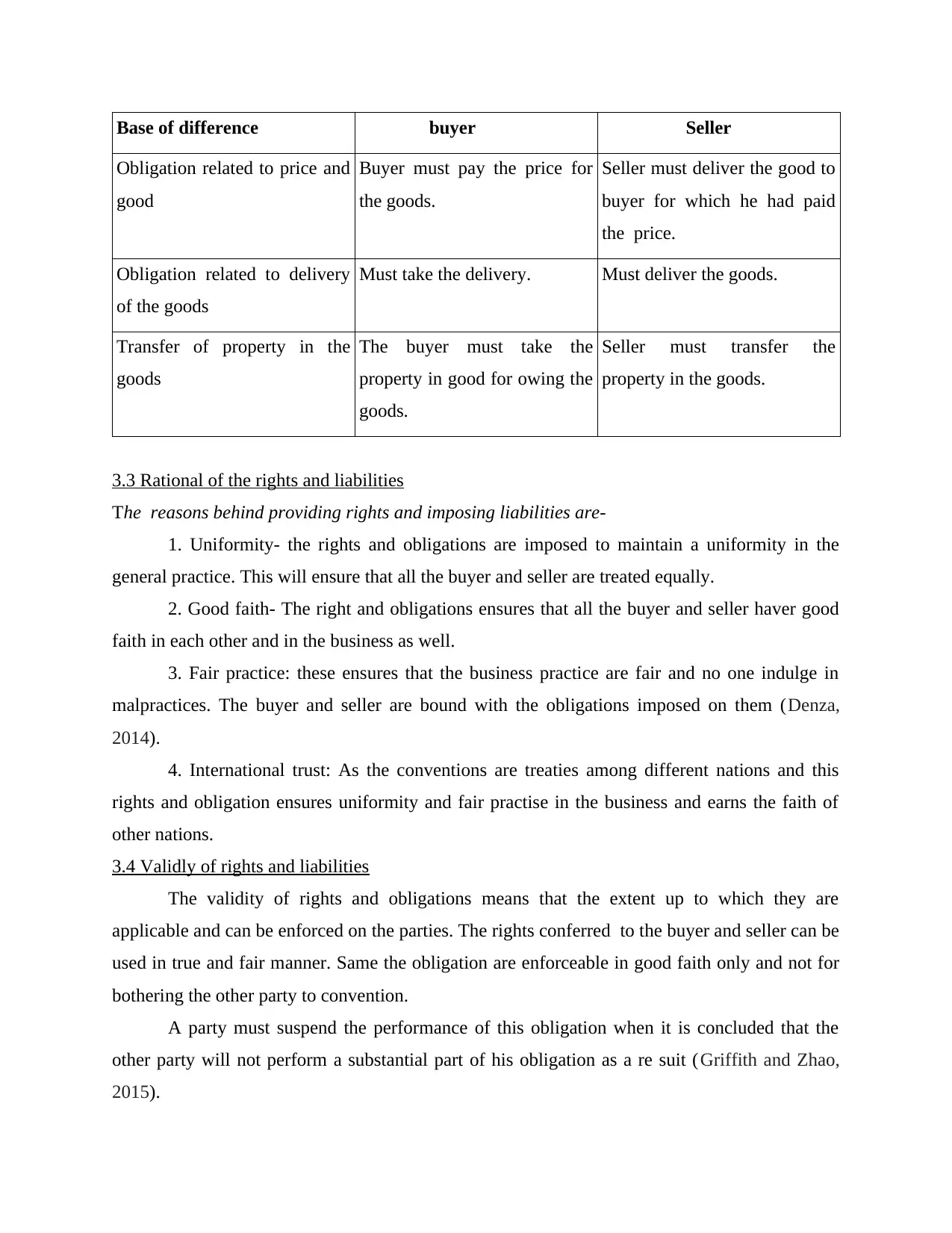
Base of difference buyer Seller
Obligation related to price and
good
Buyer must pay the price for
the goods.
Seller must deliver the good to
buyer for which he had paid
the price.
Obligation related to delivery
of the goods
Must take the delivery. Must deliver the goods.
Transfer of property in the
goods
The buyer must take the
property in good for owing the
goods.
Seller must transfer the
property in the goods.
3.3 Rational of the rights and liabilities
The reasons behind providing rights and imposing liabilities are-
1. Uniformity- the rights and obligations are imposed to maintain a uniformity in the
general practice. This will ensure that all the buyer and seller are treated equally.
2. Good faith- The right and obligations ensures that all the buyer and seller haver good
faith in each other and in the business as well.
3. Fair practice: these ensures that the business practice are fair and no one indulge in
malpractices. The buyer and seller are bound with the obligations imposed on them (Denza,
2014).
4. International trust: As the conventions are treaties among different nations and this
rights and obligation ensures uniformity and fair practise in the business and earns the faith of
other nations.
3.4 Validly of rights and liabilities
The validity of rights and obligations means that the extent up to which they are
applicable and can be enforced on the parties. The rights conferred to the buyer and seller can be
used in true and fair manner. Same the obligation are enforceable in good faith only and not for
bothering the other party to convention.
A party must suspend the performance of this obligation when it is concluded that the
other party will not perform a substantial part of his obligation as a re suit (Griffith and Zhao,
2015).
Obligation related to price and
good
Buyer must pay the price for
the goods.
Seller must deliver the good to
buyer for which he had paid
the price.
Obligation related to delivery
of the goods
Must take the delivery. Must deliver the goods.
Transfer of property in the
goods
The buyer must take the
property in good for owing the
goods.
Seller must transfer the
property in the goods.
3.3 Rational of the rights and liabilities
The reasons behind providing rights and imposing liabilities are-
1. Uniformity- the rights and obligations are imposed to maintain a uniformity in the
general practice. This will ensure that all the buyer and seller are treated equally.
2. Good faith- The right and obligations ensures that all the buyer and seller haver good
faith in each other and in the business as well.
3. Fair practice: these ensures that the business practice are fair and no one indulge in
malpractices. The buyer and seller are bound with the obligations imposed on them (Denza,
2014).
4. International trust: As the conventions are treaties among different nations and this
rights and obligation ensures uniformity and fair practise in the business and earns the faith of
other nations.
3.4 Validly of rights and liabilities
The validity of rights and obligations means that the extent up to which they are
applicable and can be enforced on the parties. The rights conferred to the buyer and seller can be
used in true and fair manner. Same the obligation are enforceable in good faith only and not for
bothering the other party to convention.
A party must suspend the performance of this obligation when it is concluded that the
other party will not perform a substantial part of his obligation as a re suit (Griffith and Zhao,
2015).
Paraphrase This Document
Need a fresh take? Get an instant paraphrase of this document with our AI Paraphraser
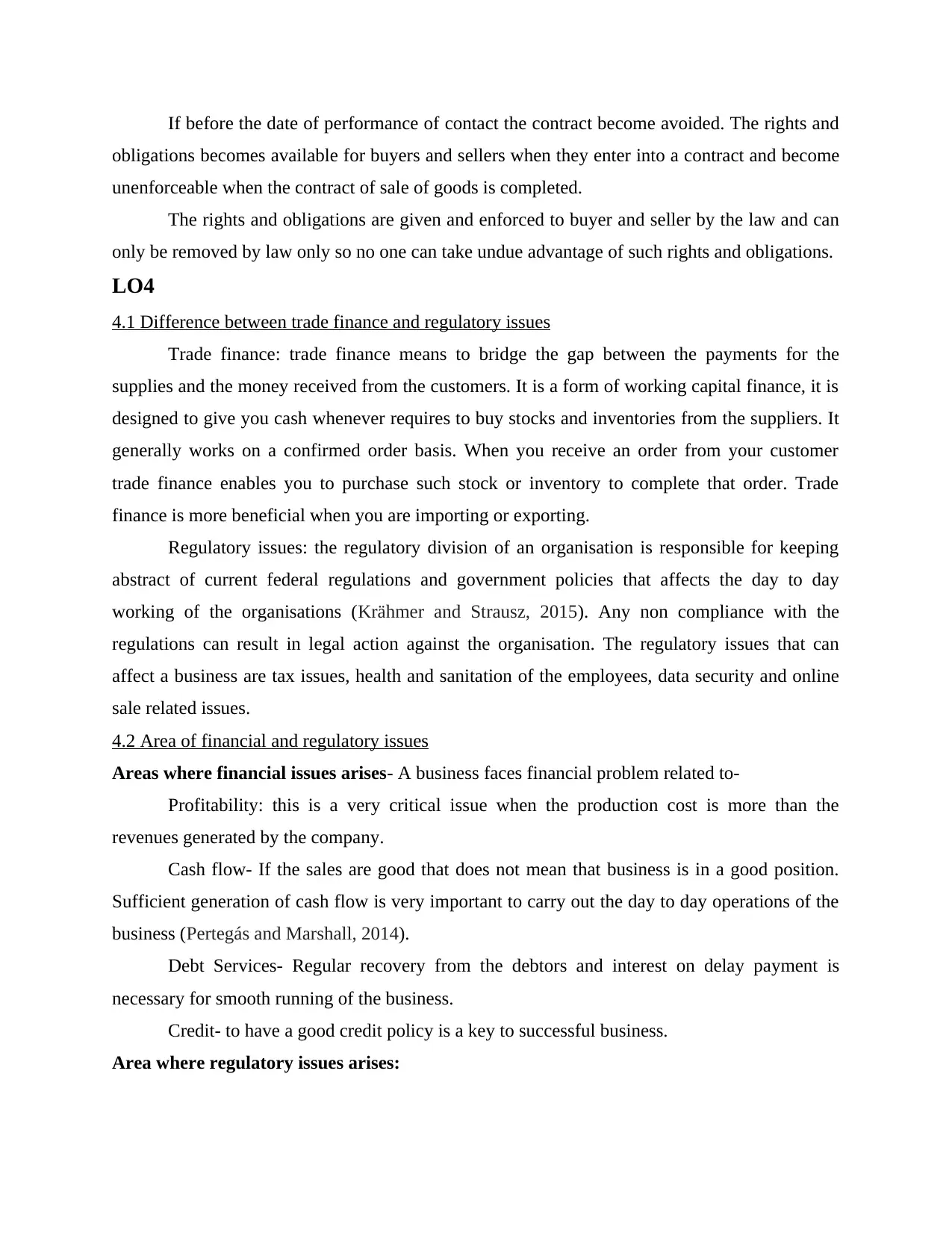
If before the date of performance of contact the contract become avoided. The rights and
obligations becomes available for buyers and sellers when they enter into a contract and become
unenforceable when the contract of sale of goods is completed.
The rights and obligations are given and enforced to buyer and seller by the law and can
only be removed by law only so no one can take undue advantage of such rights and obligations.
LO4
4.1 Difference between trade finance and regulatory issues
Trade finance: trade finance means to bridge the gap between the payments for the
supplies and the money received from the customers. It is a form of working capital finance, it is
designed to give you cash whenever requires to buy stocks and inventories from the suppliers. It
generally works on a confirmed order basis. When you receive an order from your customer
trade finance enables you to purchase such stock or inventory to complete that order. Trade
finance is more beneficial when you are importing or exporting.
Regulatory issues: the regulatory division of an organisation is responsible for keeping
abstract of current federal regulations and government policies that affects the day to day
working of the organisations (Krähmer and Strausz, 2015). Any non compliance with the
regulations can result in legal action against the organisation. The regulatory issues that can
affect a business are tax issues, health and sanitation of the employees, data security and online
sale related issues.
4.2 Area of financial and regulatory issues
Areas where financial issues arises- A business faces financial problem related to-
Profitability: this is a very critical issue when the production cost is more than the
revenues generated by the company.
Cash flow- If the sales are good that does not mean that business is in a good position.
Sufficient generation of cash flow is very important to carry out the day to day operations of the
business (Pertegás and Marshall, 2014).
Debt Services- Regular recovery from the debtors and interest on delay payment is
necessary for smooth running of the business.
Credit- to have a good credit policy is a key to successful business.
Area where regulatory issues arises:
obligations becomes available for buyers and sellers when they enter into a contract and become
unenforceable when the contract of sale of goods is completed.
The rights and obligations are given and enforced to buyer and seller by the law and can
only be removed by law only so no one can take undue advantage of such rights and obligations.
LO4
4.1 Difference between trade finance and regulatory issues
Trade finance: trade finance means to bridge the gap between the payments for the
supplies and the money received from the customers. It is a form of working capital finance, it is
designed to give you cash whenever requires to buy stocks and inventories from the suppliers. It
generally works on a confirmed order basis. When you receive an order from your customer
trade finance enables you to purchase such stock or inventory to complete that order. Trade
finance is more beneficial when you are importing or exporting.
Regulatory issues: the regulatory division of an organisation is responsible for keeping
abstract of current federal regulations and government policies that affects the day to day
working of the organisations (Krähmer and Strausz, 2015). Any non compliance with the
regulations can result in legal action against the organisation. The regulatory issues that can
affect a business are tax issues, health and sanitation of the employees, data security and online
sale related issues.
4.2 Area of financial and regulatory issues
Areas where financial issues arises- A business faces financial problem related to-
Profitability: this is a very critical issue when the production cost is more than the
revenues generated by the company.
Cash flow- If the sales are good that does not mean that business is in a good position.
Sufficient generation of cash flow is very important to carry out the day to day operations of the
business (Pertegás and Marshall, 2014).
Debt Services- Regular recovery from the debtors and interest on delay payment is
necessary for smooth running of the business.
Credit- to have a good credit policy is a key to successful business.
Area where regulatory issues arises:
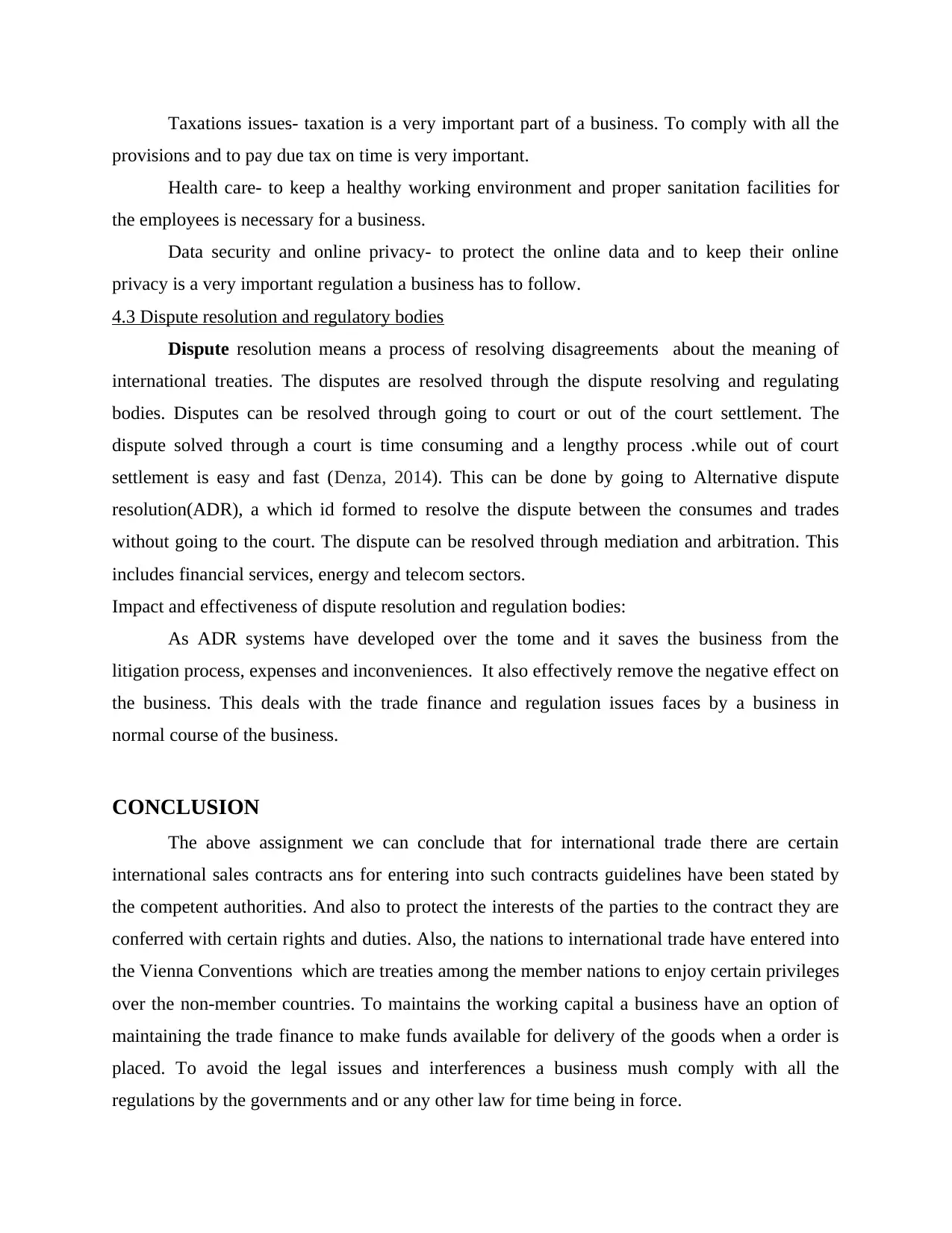
Taxations issues- taxation is a very important part of a business. To comply with all the
provisions and to pay due tax on time is very important.
Health care- to keep a healthy working environment and proper sanitation facilities for
the employees is necessary for a business.
Data security and online privacy- to protect the online data and to keep their online
privacy is a very important regulation a business has to follow.
4.3 Dispute resolution and regulatory bodies
Dispute resolution means a process of resolving disagreements about the meaning of
international treaties. The disputes are resolved through the dispute resolving and regulating
bodies. Disputes can be resolved through going to court or out of the court settlement. The
dispute solved through a court is time consuming and a lengthy process .while out of court
settlement is easy and fast (Denza, 2014). This can be done by going to Alternative dispute
resolution(ADR), a which id formed to resolve the dispute between the consumes and trades
without going to the court. The dispute can be resolved through mediation and arbitration. This
includes financial services, energy and telecom sectors.
Impact and effectiveness of dispute resolution and regulation bodies:
As ADR systems have developed over the tome and it saves the business from the
litigation process, expenses and inconveniences. It also effectively remove the negative effect on
the business. This deals with the trade finance and regulation issues faces by a business in
normal course of the business.
CONCLUSION
The above assignment we can conclude that for international trade there are certain
international sales contracts ans for entering into such contracts guidelines have been stated by
the competent authorities. And also to protect the interests of the parties to the contract they are
conferred with certain rights and duties. Also, the nations to international trade have entered into
the Vienna Conventions which are treaties among the member nations to enjoy certain privileges
over the non-member countries. To maintains the working capital a business have an option of
maintaining the trade finance to make funds available for delivery of the goods when a order is
placed. To avoid the legal issues and interferences a business mush comply with all the
regulations by the governments and or any other law for time being in force.
provisions and to pay due tax on time is very important.
Health care- to keep a healthy working environment and proper sanitation facilities for
the employees is necessary for a business.
Data security and online privacy- to protect the online data and to keep their online
privacy is a very important regulation a business has to follow.
4.3 Dispute resolution and regulatory bodies
Dispute resolution means a process of resolving disagreements about the meaning of
international treaties. The disputes are resolved through the dispute resolving and regulating
bodies. Disputes can be resolved through going to court or out of the court settlement. The
dispute solved through a court is time consuming and a lengthy process .while out of court
settlement is easy and fast (Denza, 2014). This can be done by going to Alternative dispute
resolution(ADR), a which id formed to resolve the dispute between the consumes and trades
without going to the court. The dispute can be resolved through mediation and arbitration. This
includes financial services, energy and telecom sectors.
Impact and effectiveness of dispute resolution and regulation bodies:
As ADR systems have developed over the tome and it saves the business from the
litigation process, expenses and inconveniences. It also effectively remove the negative effect on
the business. This deals with the trade finance and regulation issues faces by a business in
normal course of the business.
CONCLUSION
The above assignment we can conclude that for international trade there are certain
international sales contracts ans for entering into such contracts guidelines have been stated by
the competent authorities. And also to protect the interests of the parties to the contract they are
conferred with certain rights and duties. Also, the nations to international trade have entered into
the Vienna Conventions which are treaties among the member nations to enjoy certain privileges
over the non-member countries. To maintains the working capital a business have an option of
maintaining the trade finance to make funds available for delivery of the goods when a order is
placed. To avoid the legal issues and interferences a business mush comply with all the
regulations by the governments and or any other law for time being in force.
⊘ This is a preview!⊘
Do you want full access?
Subscribe today to unlock all pages.

Trusted by 1+ million students worldwide
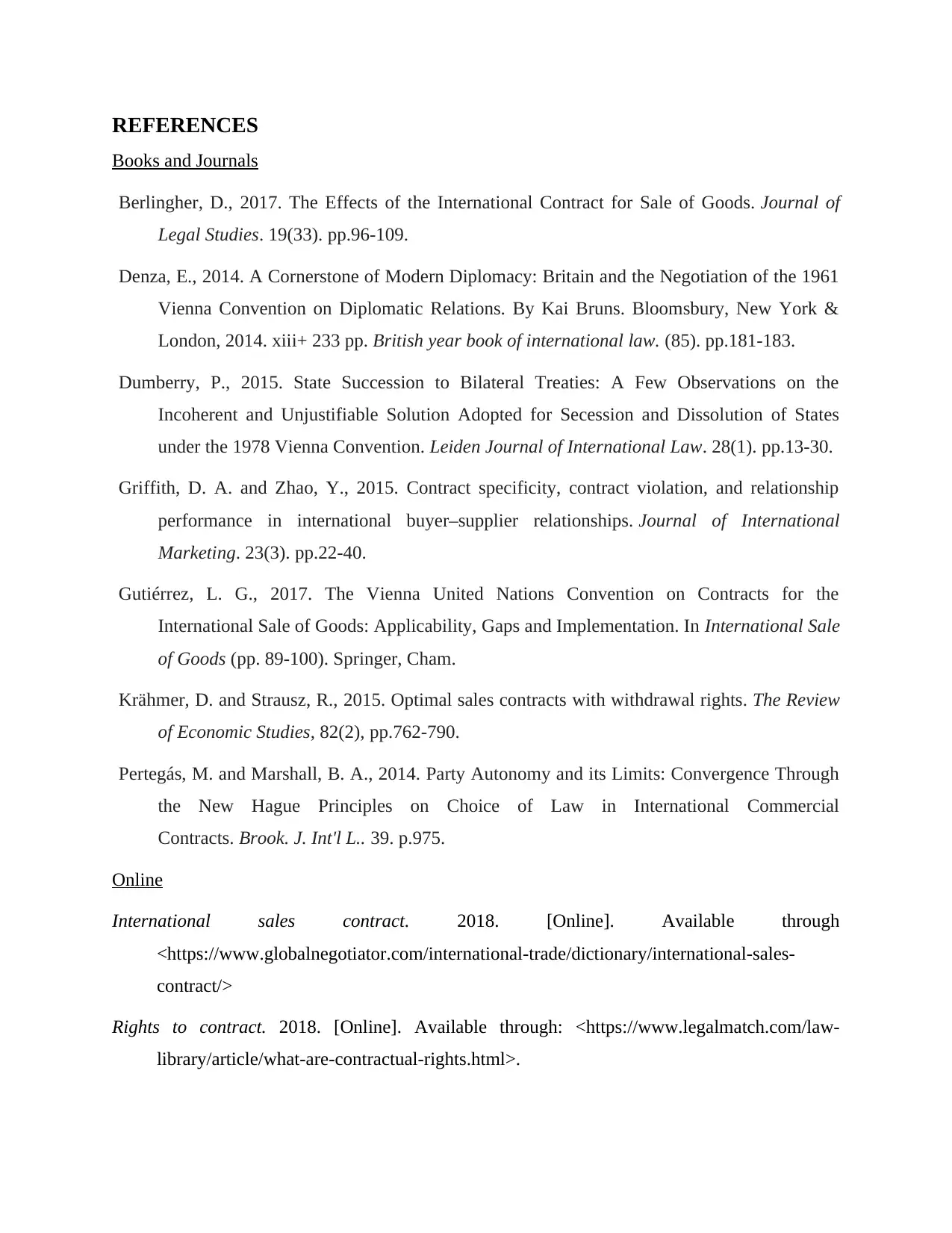
REFERENCES
Books and Journals
Berlingher, D., 2017. The Effects of the International Contract for Sale of Goods. Journal of
Legal Studies. 19(33). pp.96-109.
Denza, E., 2014. A Cornerstone of Modern Diplomacy: Britain and the Negotiation of the 1961
Vienna Convention on Diplomatic Relations. By Kai Bruns. Bloomsbury, New York &
London, 2014. xiii+ 233 pp. British year book of international law. (85). pp.181-183.
Dumberry, P., 2015. State Succession to Bilateral Treaties: A Few Observations on the
Incoherent and Unjustifiable Solution Adopted for Secession and Dissolution of States
under the 1978 Vienna Convention. Leiden Journal of International Law. 28(1). pp.13-30.
Griffith, D. A. and Zhao, Y., 2015. Contract specificity, contract violation, and relationship
performance in international buyer–supplier relationships. Journal of International
Marketing. 23(3). pp.22-40.
Gutiérrez, L. G., 2017. The Vienna United Nations Convention on Contracts for the
International Sale of Goods: Applicability, Gaps and Implementation. In International Sale
of Goods (pp. 89-100). Springer, Cham.
Krähmer, D. and Strausz, R., 2015. Optimal sales contracts with withdrawal rights. The Review
of Economic Studies, 82(2), pp.762-790.
Pertegás, M. and Marshall, B. A., 2014. Party Autonomy and its Limits: Convergence Through
the New Hague Principles on Choice of Law in International Commercial
Contracts. Brook. J. Int'l L.. 39. p.975.
Online
International sales contract. 2018. [Online]. Available through
<https://www.globalnegotiator.com/international-trade/dictionary/international-sales-
contract/>
Rights to contract. 2018. [Online]. Available through: <https://www.legalmatch.com/law-
library/article/what-are-contractual-rights.html>.
Books and Journals
Berlingher, D., 2017. The Effects of the International Contract for Sale of Goods. Journal of
Legal Studies. 19(33). pp.96-109.
Denza, E., 2014. A Cornerstone of Modern Diplomacy: Britain and the Negotiation of the 1961
Vienna Convention on Diplomatic Relations. By Kai Bruns. Bloomsbury, New York &
London, 2014. xiii+ 233 pp. British year book of international law. (85). pp.181-183.
Dumberry, P., 2015. State Succession to Bilateral Treaties: A Few Observations on the
Incoherent and Unjustifiable Solution Adopted for Secession and Dissolution of States
under the 1978 Vienna Convention. Leiden Journal of International Law. 28(1). pp.13-30.
Griffith, D. A. and Zhao, Y., 2015. Contract specificity, contract violation, and relationship
performance in international buyer–supplier relationships. Journal of International
Marketing. 23(3). pp.22-40.
Gutiérrez, L. G., 2017. The Vienna United Nations Convention on Contracts for the
International Sale of Goods: Applicability, Gaps and Implementation. In International Sale
of Goods (pp. 89-100). Springer, Cham.
Krähmer, D. and Strausz, R., 2015. Optimal sales contracts with withdrawal rights. The Review
of Economic Studies, 82(2), pp.762-790.
Pertegás, M. and Marshall, B. A., 2014. Party Autonomy and its Limits: Convergence Through
the New Hague Principles on Choice of Law in International Commercial
Contracts. Brook. J. Int'l L.. 39. p.975.
Online
International sales contract. 2018. [Online]. Available through
<https://www.globalnegotiator.com/international-trade/dictionary/international-sales-
contract/>
Rights to contract. 2018. [Online]. Available through: <https://www.legalmatch.com/law-
library/article/what-are-contractual-rights.html>.
1 out of 10
Related Documents
Your All-in-One AI-Powered Toolkit for Academic Success.
+13062052269
info@desklib.com
Available 24*7 on WhatsApp / Email
![[object Object]](/_next/static/media/star-bottom.7253800d.svg)
Unlock your academic potential
Copyright © 2020–2025 A2Z Services. All Rights Reserved. Developed and managed by ZUCOL.





